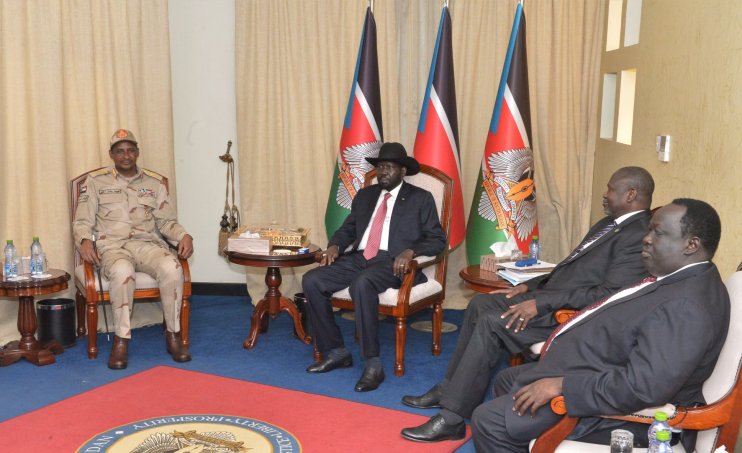Kiir, Machar refer states issue to South Africa

January 15, 2019 (JUBA) – South Sudan’s main peace partners on Wednesday agreed to refer the sticky issue of the number and boundaries of states to the South African deputy president to broker a compromise.
President Salva Kiir and the SPLM-IO leader Riek Machar met in Juba in presence of Mohamed Hamdan Daglo, Sudanese leading member of the Sovereign Council to discuss the contention over the 32 states.
Kiir struggles to keep the contested territorial administrative system while Machar and other peace parties call to restore the 10-state system if the president refuses their demand to review the boundaries and the number of states.
Presidential adviser Tut Kew Gatluak stated after the meeting that the two leaders discussed the number of states and they will continue to tackle it with the other peace partners.
Gatluak further pointed to the role played by South Africa’s deputy president David Mabuza to reach an agreement over this issue.
“We agreed to allow him more time to hold further consultations with the peace parties. This issue of the states involves all the signatories to the revitalized agreement and I’m sure we will reach an agreement,” he said.
Last December, Mabuza held a two-day meeting in Juba with the peace partners on the number of states but they failed to strike a deal.
The South African deputy president, however, said the parties are narrowing two options on the number of states without elaborating on it.
“Where we are now we have nudged all the parties and we are only left with two views and these two views, we are going to escalate them,” Mabuza told porters.
For his part, Democratic Change Party leader Lam Akol said that there was a proposal to arrive at some figure between 10 and 32 states.
Recently, the SPLM-IO accused the South Sudanese government of seeking to organize demonstrations in support of Salva Kiir’s refusal to compromise over the number of states and boundaries.
Gatluak stressed that the difference over the number of states will not prevent the formation of the transitional government next month.
The IGAD which brokered the peace agreement and the international community praised the regular meetings between the two leaders saying it would contribute to build confidence and pave the way for a successful transition.
(ST)
